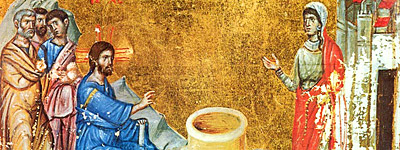

| Previous day | Next day |
| Old Style
May 1
|
Sunday |
New Style
May 14
|
| 5th Sunday of Pascha. Sunday of the Samaritan Woman. Tone 4. | No fast.
|
![]() Prophet Jeremiah (6th c. b.c.).
Prophet Jeremiah (6th c. b.c.). ![]() St. Paphnutius, abbot, of Borovsk (1477).
St. Paphnutius, abbot, of Borovsk (1477).
Hieromartyr Batas, abbot, of Nisibis (4th c.). St. Tamara, queen of Georgia (1213). Hieromartyr Macarius, metropolitan of Kiev (1497). St. Gerasimus, founder of Boldino Monastery (Smolensk) (1554). New Monk-martyrs Euthymius (1814) and Ignatius (1814) and Acacius of Serres (1816), at Constantinople. St. Luke (Shvets), schemamonk of Glinsk Hermitage (1898).
New Hiero-confessor Tryphon of Svyatogorsk Monastery (1939). Synaxis of New Martyrs of Izyum (Ukraine).
“Unexpected Joy” Icon of the Most Holy Theotokos.
St. Brieuc, abbot, in Brittany (ca. 502). Martyr Sigismund, king of Burgundy (524). St. Asaph, bishop of Llanelwy, North Wales (ca. 600). St. Ultan, Irish missionary monk, of Burgh Castle (East Anglia), Fosse, and Peronne (Gaul) (680). New Monk-martyr Romanus of Raqqa (780). St. Michael, ascetic, of Chalcedon (8th c.-9th c.). St. Zosimas, bishop of Kumurdo (15th c.-16th c). St. Panaretus, bishop of Paphos on Cyprus (1791). St. Nicephorus of Chios, monk (1821). New Martyr Maria of Merambelos on Crete (1826). Martyr Philosophus at Alexandria (252). St. Isidora the Fool-for-Christ, of Tabennisi, Egypt (ca. 365).
Thoughts for Each Day of the Year
According to the Daily Church Readings from the Word of God
By St. Theophan the Recluse

Sunday of the Samaritan Woman. [Acts 11:19–26, 29–30; John 4:5–42]
The Samaritan’s woman fellow citizens said to her after two days with the Saviour in their midst, Now we believe not because of thy saying: for we have heard him ourselves, and know that this is indeed the Christ, the Saviour of the world (John 4:42). It happens this way with everyone. At first they are called to the Lord by an external word, or as for many now, simply by birth. But when they taste in practice what it is to live in the Lord, they no longer cleave to the Lord through their external affiliation with Christian society, but through their inner union with Him. It is necessary for all who are born in Christian societies to make this a law for themselves; that is, to not limit themselves to mere external affiliation with the Lord, but to seek to unite with Him inwardly, that they may always bear witness within themselves that they are standing in the truth. Why is this necessary? It is necessary to embody within oneself the truth of Christ. The truth of Christ is a restoration of what is fallen. Thus, put off the old man, which is corrupt according to deceitful lusts, and put on the new man, which is created after God in righteousness and true holiness (cf. Eph. 4:22–24), and you will know within yourself that the Lord Jesus Christ is in truth the Saviour—not only for the world, but also for you.
Articles
 Venerable Paphnutius the Abbot of BorovSaint Paphnutius of Borov was born in 1394 in the village of Kudinovo, not far from Borov, and at Baptism he was named Parthenius |
 Martyr Bata the PersianThe Martyr Bata, a monastic, lived during the fourth century in Persia and labored there in one of the monasteries. |
 New Martyr Euthymius of Mt AthosThis holy New Martyr of Christ was born in Demitsana in the Peloponnesos. His parents were Panagiotes and Maria, and he was given the name Eleutherius in Baptism. |
 New Martyr Ignatius the Martyr of Mt AthosThe holy New Martyr Ignatius was born in the village of Eski Zagora in the Trnovo region of Bulgaria, and was named John in Baptism. |
 Sunday of the Samaritan Woman |










